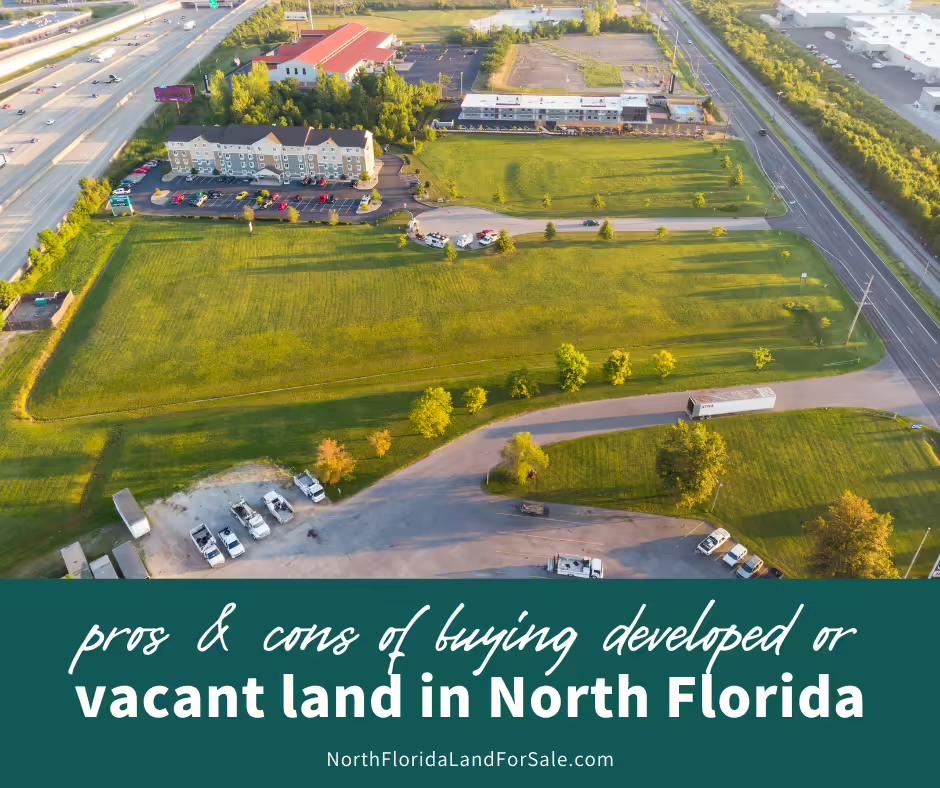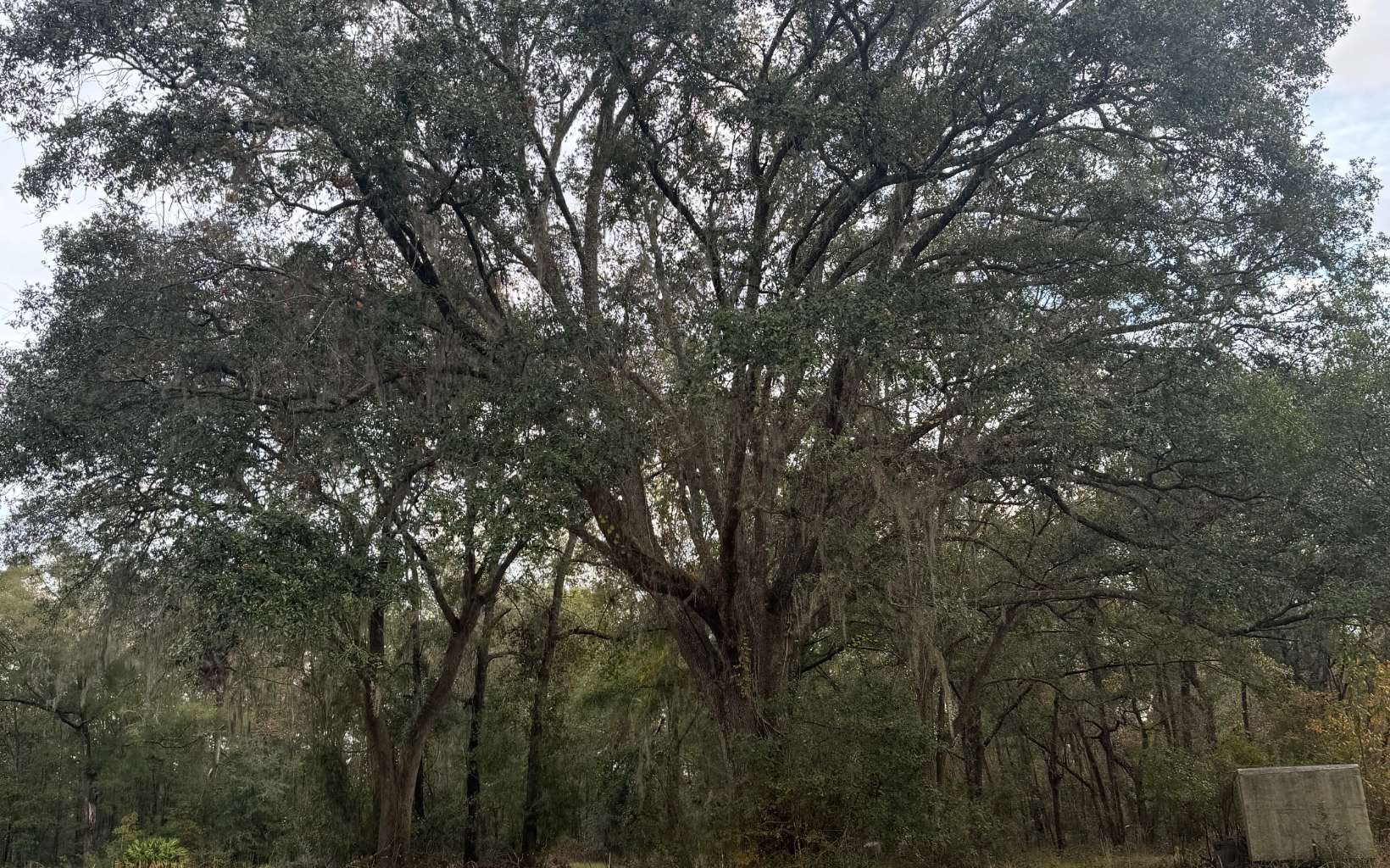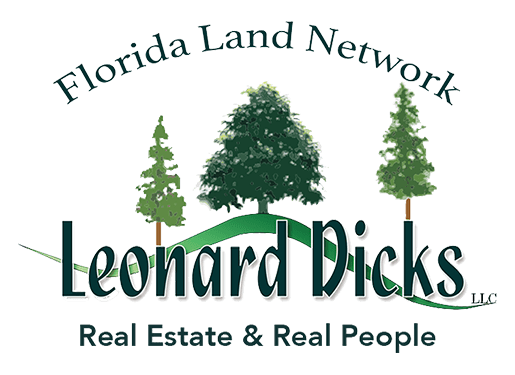
When considering property in North Florida, you’ll face the choice between purchasing vacant land or a developed property. Each option has unique benefits and drawbacks depending on your goals, budget, and timeline. Here’s a guide to the pros and cons of both choices to help you decide which type of property best fits your vision.
North Florida Vacant Land vs. Developed Property: Pros & Cons
Whether you’re looking for a fresh start with vacant land or a move-in-ready developed property, knowing the key factors for each option will guide you toward the best decision. This guide covers:
- The flexibility of vacant land
- The advantages of developed properties
- Considerations for budgeting and financing
- Potential for customization and upgrades
- Long-term value and investment return
Here’s a detailed look at each.
The Flexibility of Vacant Land
Pros:
Vacant land offers unmatched flexibility, allowing you to shape the property from the ground up. With vacant land, you’re free to build exactly what you want, whether that’s a custom home, an agricultural project, or a recreational retreat. North Florida’s rural regions offer plenty of options for spacious, affordable land, especially in areas like Suwannee or Madison counties. Without existing structures, you won’t need to factor in demolitions or renovations, making it easier to start with a clean slate.
Cons:
While vacant land provides flexibility, it also means additional work to make the property usable. Developing infrastructure—like installing utilities, septic systems, and road access—can be costly and time-consuming. Zoning restrictions and permitting processes may add complexity, and working with local authorities to ensure compliance is crucial. Additionally, vacant land often requires a larger upfront investment for development, which can be a drawback for those looking to avoid construction costs or lengthy timelines.
The Advantages of Developed Properties
Pros:
Developed properties come with the advantage of existing infrastructure, making them move-in-ready or immediately usable for residential or commercial purposes. When buying a developed property, utilities, water access, and roads are typically already in place, which can save significant time and money. This option is ideal for buyers who want immediate occupancy or rental income potential, as North Florida’s developed properties offer ready access to local amenities and established communities.
Cons:
One downside of developed properties is limited flexibility. You’ll have to work with existing structures and layouts, which might not meet your exact preferences. Renovations and updates can be expensive, and in some cases, older structures may require substantial repairs or improvements to suit your vision. Additionally, the purchase price of developed properties is often higher than vacant land due to the value of the existing buildings and infrastructure, which can impact budgeting.
Considerations for Budgeting and Financing
Vacant Land Budgeting:
Vacant land typically costs less per acre than developed property, making it an attractive option for buyers with limited budgets or those seeking larger parcels. However, financing vacant land can be more challenging, as lenders often require higher down payments and offer shorter loan terms. Expenses related to development—like installing utilities and preparing the land—should also be factored into the budget.
Developed Property Budgeting:
Financing developed property is often easier, as banks view it as a lower risk compared to undeveloped land. Lenders are more likely to provide favorable loan terms, including lower down payments and longer terms, which can make developed property more accessible. However, the upfront cost for developed properties is usually higher, as it reflects the value of the existing buildings and amenities. It’s important to account for any potential renovation or maintenance costs if the property requires upgrades.
Potential for Customization and Upgrades
Vacant Land Customization:
With vacant land, customization options are nearly endless. You can design and build to match your exact preferences, from choosing the layout of structures to landscaping and amenities. This flexibility allows you to create a property that aligns with your long-term vision, whether it’s a homestead, a farm, or a private retreat. The freedom to build from scratch can be especially appealing if you have specific requirements or want to ensure energy efficiency and sustainability features.
Developed Property Customization:
While developed properties come with pre-existing structures, customization is still possible through renovations or additions. For example, you can remodel an interior, add new features, or even expand existing structures to better meet your needs. However, the ability to customize is often limited by the existing design and layout, which may require costly alterations. Buyers with extensive customization plans should factor renovation costs into their budget and consider how much flexibility the property allows.
Long-Term Value and Investment Return
Vacant Land Investment:
Vacant land holds potential for long-term appreciation, particularly in growing areas of North Florida. With minimal maintenance costs, vacant land can be a “buy and hold” investment, allowing you to wait for the right development opportunity or increased property values. Additionally, vacant land can be a low-maintenance investment, with lower property taxes and fewer ongoing expenses compared to developed properties. If managed well, vacant land can offer solid returns over time, especially as North Florida’s rural areas experience growth.
Developed Property Investment:
Developed properties offer immediate utility, which can mean quicker returns on investment through renting or leasing, especially if located in high-demand areas. North Florida’s residential and commercial properties provide opportunities for rental income or resale, allowing you to benefit from immediate cash flow. However, maintenance costs and property taxes are generally higher, and the structure’s condition may impact future resale value. Developed properties are often a faster route to income generation but may require active management to maintain value.
Are You Buying a Home or Land for Sale in Lake City?
If you’re moving to Lake City, we can help you find the perfect place to live. Call us at 386-243-0124 to tell us what you want from your home and we will begin searching right away.
Check these out:
- Paved road frontage for sale in Columbia County
- Non-deed-restricted land for sale in Columbia County
- Wooded oak tree land for sale in Columbia County
- Land-for-land home combo in Lake City
- Waterfront residential in Lake City
- Waterfront land in Columbia County
- Bank-owned homes and foreclosure in Columbia County
- Short sales in Columbia County



